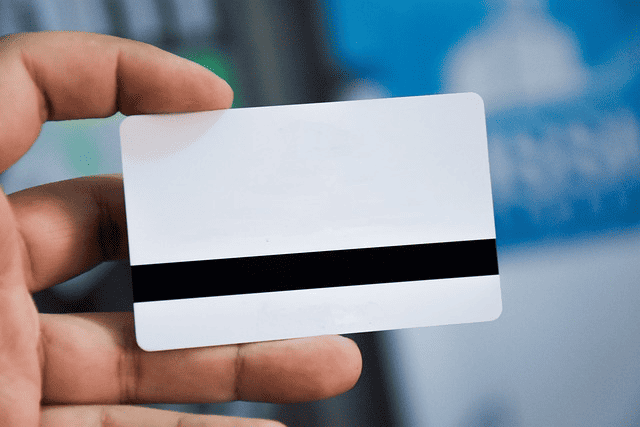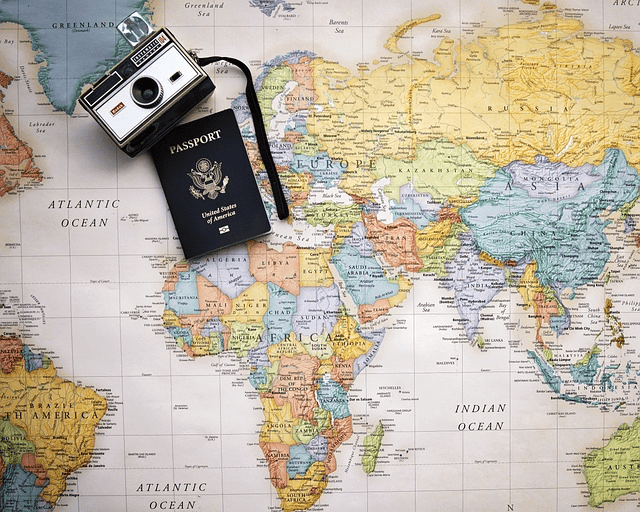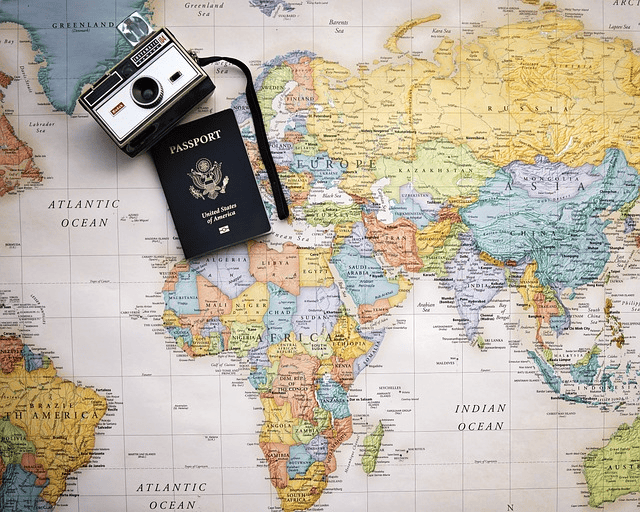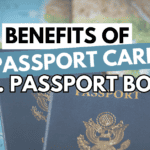Shelly S
Benefits of Passport Card vs. Book: What You Need to Know in 2023
Does your wanderlust have you constantly dreaming of new destinations and adventures? If so, choosing the right travel document can make all the difference in easily exploring the world. With passport cards gaining popularity, you might wonder if they’re a better fit for your travels than the traditional passport book.
This comprehensive guide will help you understand the benefits of a passport card vs. a book, ensuring you make the best decision for your globetrotting escapades.
Short Summary
Passport cards and passport books are two distinct forms of travel documents, each with its features. The card is wallet-sized for land/sea travelers to Canada, Mexico, etc., while the book provides global acceptance.
Passport cards offer cost savings and expedited border entry benefits, whereas a passport book offers versatility in travel plans, visa requirements & stamps.
Obtaining both can be beneficial due to increased options & flexibility for international travel at an affordable price.
Understanding Passport Cards and Passport Books

Passport cards and passport books are two types of travel documents issued by the US government for its citizens. While they serve the same purpose of identification during international travel, they have some key differences in size, format, and usage.
So, what sets them apart, and which should you choose for your next adventure? Let’s dive into the world of passport cards and books to find out.
Passport Card Overview
A passport card is a wallet-sized identification card, similar to a driver’s license, used mainly for foreign border entry by land and sea in specific locations, such as Canada, Mexico, Bermuda, and the Caribbean.
First-time applicants must submit documentation verifying their U.S. citizenship, such as a birth certificate, naturalization certificate, or a valid U.S. passport.
The cost of a passport card varies depending on the applicant’s age, with minors paying $50, adults paying $65, and adults who received their most recently issued passport when they were 16 or older paying $30.
The validity period for applicants under 16 years old is five years, and for those over 16, it is ten years.
However, it is important to note that passport cards are not valid for international air travel.
They are best suited for frequent land and sea travelers, especially those who regularly travel to Canada, Mexico, or the Caribbean and want a more compact document for domestic flights.
Passport Book Overview
A passport book is the traditional form of passport used for identification during international travels.
It is standardized and accepted across the globe. It is a 3.5-by-5-inch booklet that contains the traveler’s photograph and personal details, such as full name, nationality, date of birth, place of birth, sex, the date of passport issuance, and passport expiration date on the initial page.
The subsequent pages are left blank for immigration stamps and visas.
The cost of obtaining a passport book is higher than that of a passport card, with first-time applicants aged 16 and older paying $145 and those under 16 paying $135.
Renewing a passport book by mail costs $110. The validity period of a passport book is the same as that of a passport card, with ten years for adults and five years for minors.
Benefits of a Passport Card

Passport cards offer several advantages over passport books, making them an attractive option for certain travelers. The most significant benefits include their cost-effectiveness, convenient size and format, and expedited border entry.
Let’s take a closer look at each of these benefits.
Cost-Effective
One of the main advantages of a passport card is its affordability. For first-time applicants, a child passport card costs $50, while an adult passport card costs $65. A passport book costs $135 for a child and $165 for an adult.
Renewals for passport cards are also more economical than those for passport books, with adult passport card renewals costing only $30, while adult passport book renewals cost $130. This makes the passport card a more cost-effective option for travelers who frequent eligible destinations and don’t require the additional features of a passport book.
Convenient Size and Format
The compact size of the passport card is another appealing feature for many travelers. Measuring 5” x 3 12”, passport cards are the size of a standard credit card or driver’s license, making them easy to carry in a wallet or purse.
This convenience is especially attractive for those who regularly cross land borders or embark on sea travel to eligible countries.
Moreover, the wallet-sized format allows the passport card to serve as an alternative form of identification for non-drivers and children.
Expedited Border Entry
Passport cards facilitate expedited border entry, enabling travelers to cross borders promptly and effortlessly.
They can be used in Ready Lanes, special lanes provided by the U.S. Customs and Border Protection for expedited vehicle and pedestrian border entry for authorized users, such as those with passport cards.
This feature is particularly beneficial for travelers who frequently cross land borders into Canada and Mexico, as it saves them time and hassle during their journeys.
Benefits of a Passport Book

While passport cards offer several advantages, passport books also have their benefits, making them indispensable travel documents for many. The primary benefits of a passport book include its versatility in travel, global acceptance, and the ability to meet visa requirements and stamps.
Versatility in Travel

A passport book allows unrestricted travel, making it the ideal choice for those planning to explore various international destinations by air, land, or sea.
While a passport card is only valid for land and sea travel to certain countries, a passport book has no limitations, offering greater freedom and flexibility in travel plans.
In addition, a passport book is mandatory for international air travel, making it an essential document for globetrotters who prefer to fly to their destinations.
Global Acceptance
Another significant benefit of a passport book is its global acceptance. While a passport card is only valid in North America, a passport book is accepted universally as a valid travel document.
However, it is important to note that entry requirements may differ between countries, so it is always a good idea to check your destination’s specific visa and entry requirements before you travel.
Visa Requirements and Stamps
A passport book also allows visa requirements and stamps for entry into many countries. Visa stamps are documents issued by a country’s government that permit a person to enter, exit, or remain in the country for a specified period.
The blank pages in a passport book are designed specifically for these stamps and visas, ensuring you can easily meet the entry requirements for your international travels.
On the other hand, passport cards do not provide space for visa stamps, limiting their utility for more extensive international trips.
When to Choose a Passport Card or Passport Book

When deciding between a passport card and a passport book, it’s essential to consider your unique travel needs and preferences. Some travelers may find that a passport card is sufficient for their travel plans, while others may require additional benefits from a passport book.
Let’s explore the scenarios in which each option might be best suited.
Frequent Land and Sea Travelers
Passport cards are an excellent option for frequent land and sea travelers, particularly those visiting Canada, Mexico, Bermuda, or the Caribbean regularly. The wallet-sized design makes them easy to carry and use, and their cost-effectiveness appeals to travelers who frequently cross borders by land or sea.
Moreover, passport cards can be used for expedited border entry through Ready Lanes, saving time and hassle during your trips.
International Air Travelers
A passport book is a must-have for those who plan to travel internationally by air. Passport books are the only documents authorized for international air travel, and their global acceptance means that you can use them to enter most countries worldwide.
While passport cards can be an alternative for domestic air travel, they cannot be used internationally, making a passport book essential for globetrotters who love to fly.
Unsure of Future Travel Plans
If you’re unsure about your future travel plans or wish to have the flexibility to explore a wide range of destinations, obtaining both a passport book and a passport card may be the best option. Both documents provide the convenience of a passport card for frequent land and sea travel and the global acceptance and versatility of a passport book for international air travel and meeting visa requirements.
This combination ensures that you are prepared for any adventure that comes your way.
Obtaining Both a Passport Card and a Passport Book

Applying for a passport card and a passport book is a straightforward process and can be done simultaneously in person or via mail.
The application process is the same for both documents, and you cannot renew one without the other.
Possessing a passport card and a passport book offers several benefits, including greater flexibility in travel options, cost savings, and alternative identification.
Application Process
To apply for both a passport card and a passport book, complete the relevant forms (Form DS-11 for first-time applicants or Form DS-82 for renewals), submit the required documents, and pay the applicable fees.
Once your application is processed, you will receive your passport card and book, ensuring you are fully prepared for any travel adventure.
Remember to keep both documents safe and up-to-date, as they will be your key to exploring the world with ease and confidence.
Benefits of Having Both a passport book and a passport card
Owning a passport card and book provides you with the ultimate flexibility and convenience for all your travel needs.
The passport card is perfect for quick trips to Canada, Mexico, and other eligible destinations, while the passport book is essential for international travel and meeting visa requirements.
In addition, having both allows for cost savings, as the passport card is more affordable than the passport book and can serve as an alternative form of identification.
So, why not have the best of both worlds and enjoy the freedom and versatility of owning a passport card and book?
Summary
In conclusion, both passport cards and passport books have unique benefits and limitations, making them suitable for different types of travelers and travel needs.
Understanding the differences between these two travel documents and identifying your travel preferences, you can decide which option is best for you.
Whether you choose a cost-effective and convenient passport card, a versatile and globally accepted passport book, or decide to obtain both for maximum flexibility, you can rest assured that you’re well-equipped to embark on your next journey with confidence.
Bon voyage, and happy exploring!
Frequently Asked Questions
What are the pros and cons of a passport card?
The passport card can be convenient for those who do not travel outside North America, the Caribbean, and Bermuda since it is easy to carry and provides proof of citizenship.
However, travelers exploring countries beyond this region must acquire a traditional passport.
What are the two benefits of using a passport card?
Passport cards are a convenient and affordable travel option for those traveling within the US, Mexico, Canada, Bermuda, and certain Caribbean islands. They are significantly cheaper to obtain than a passport book and can fit easily in a wallet or purse.
Furthermore, passport cards offer the same secure travel document as a passport book but without the bulk.
Should I get both a passport card and a passport book?
Considering your potential travel destinations, you should get a passport card and book. A passport card can save money if you only visit Canada, Mexico, Bermuda, or the Caribbean.
However, for any other destination, you will need a passport book to fulfill identification requirements when traveling by air.
Is it better to get a passport card or book?
It is better to get a passport book, as it is the only document approved for international air travel. The passport card may be cheaper and sufficient for travel by land or sea to certain eligible countries. However, it should not be relied upon if further international travel is planned.
Can You Travel With An Expired Passport? Your Guide for 2023
Imagine planning the trip of a lifetime only to realize that your passport has expired! Understanding passport validity is crucial for hassle-free travel, and knowing how to handle an expired passport can save you from potential nightmares.
In this comprehensive guide, we’ll cover everything you need to know about “can a resident travel with an expired passport” and how to prevent any issues from arising.
Short Summary
Traveling with an expired passport can lead to severe consequences such as refusal of entry, detention, and financial penalties.
It is important to familiarize oneself with the specific passport validity requirements of the destination country in order to avoid complications while traveling.
By checking the expiration date and applying for renewal in advance, one can avoid passport expiration issues and have a pleasant journey.
Traveling with an Expired Passport: What You Need to Know

The short answer to the question, “Can you travel with an expired passport?” is a resounding no. Regardless of whether you’re traveling domestically or internationally, a valid passport is required in most cases.
When does my passport expire?
In general, passports expire five to ten years after being issued, however this may vary by country in which they are issued. Your passports expiration date is engraved on your travel documents along with the date they were mailed for your inspection.
This section will delve deeper into the implications of traveling with an expired passport and the steps you need to take to ensure a smooth journey.
International Travel
Embarking on international travel requires a valid passport, as it serves as proof of your identity and citizenship.
You may face difficulties boarding flights or entering your destination country without a valid passport.
Furthermore, some countries require that your passport have a minimum of six months of validity before its expiration to gain entry.
Crossing the border with an expired passport can be tricky. Customs and Border Patrol officers may require additional verification of your identity and citizenship before you are allowed in the country. In some cases, this could lead to temporary detention and financial penalties.
It is highly recommended to renew your passport prior to traveling internationally.
Domestic Travel
While domestic travel may not require a passport like international travel, you will still need a valid form of identification for domestic flights within the United States. An expired passport is not considered a valid ID, so you may be denied boarding if it’s your only identification.
Instead, bringing a valid, government-issued photo identification, such as a driver’s license or state-issued ID card, to the TSA checkpoint is best. Your passport may have expired, but there are other documents that can prove your identity. Consider bringing along some of these documents to confirm your identity.
Can you travel to Mexico or Canada on an expired passport?
Before planning your trip to Canada, Mexico, or the Caribbean, it is crucial to be aware of the Western Hemisphere Travel Initiative (WHTI) requirements for valid travel documents. The specific documents needed depend on the mode of transportation and age of the traveler:
Air Travel:
All air travelers, regardless of age, must possess a current and undamaged US passport.
Land and Sea Travel:
Travelers aged 18 and above must have a current and undamaged US passport.
Travelers aged 15 to 17 must possess one of the following documents:
Valid US passport.
Trusted Traveler Program card (Global Entry, NEXUS, or SENTRI) for expedited land and sea travel.
Enhanced Driver’s License (EDL) if available in their state of residence and meets eligibility criteria.
Enhanced Identification Card (EIC) if available in their state of residence, with limited availability and additional restrictions.
It’s important to note that an expired passport is not considered a valid form of identification under the WHTI.
Remember to check the requirements specific to your destination and consult official government websites or contact relevant authorities for the most accurate and up-to-date information.
Consequences of Traveling with an Expired Passport

The repercussions of traveling with an expired passport can be quite serious. You may be refused entry to your destination country, temporarily detained, or face financial penalties.
These consequences can be both time-consuming and costly, causing disruptions to your travel plans and potentially ruining your trip.
To avoid these undesirable outcomes, it’s crucial to ensure that your passport is valid for the entirety of your travels. Be proactive in checking the expiration date of your passport and renewing it as necessary to avoid any unpleasant surprises during your journey.
Passport Validity Requirements for Different Countries

Passport validity requirements vary depending on one’s citizenship and destination. Some countries, for instance, mandate a minimum of six months’ validity on a passport, while others may require a passport to be valid for the duration of the stay.
It’s important to familiarize yourself with the specific requirements of the country you’re visiting to avoid any complications.
Here’s a simplified table outlining passport expiration rules for select countries:
Country Passport Expiration Requirement
United States Must be valid at least 6 months beyond the intended departure date
United Kingdom Must be valid for the duration of the intended stay
Canada Must be valid for the duration of the intended stay
Australia Must be valid at least 6 months beyond the intended departure date
Germany Must be valid for at least 3 months beyond the intended departure date
France Must be valid for at least 3 months beyond the intended departure date
Japan Must be valid for the duration of the intended stay
China Must be valid for at least 6 months beyond the intended departure date
India Must be valid for at least 6 months beyond the intended departure date
Brazil Must be valid for the duration of the intended stay
South Africa Must be valid for at least 30 days beyond the intended departure date
Russia Must be valid for the duration of the intended stay
Saudi Arabia Must be valid for at least 6 months beyond the intended departure date
UA Emirates Must be valid for at least 6 months beyond the intended departure date
To ensure a smooth trip, always check the governing body of your destination country for any restrictions or special requirements regarding passport validity.
This will help you avoid the potential consequences of traveling with an expired passport and ensure you have all the necessary documentation in place for your journey.
Renewing Your Expired Passport

If you find yourself with an expired passport, don’t panic! Renewing your passport is a straightforward process that requires completing an application and paying a renewal fee.
In this section, we’ll cover the standard renewal process and expedited renewal options for those needing a faster solution.
Standard Renewal Process
The standard procedure for renewing an expired passport involves submitting Form DS-82, provided you are eligible. To qualify for passport renewal, you must renew your passport within five years of the date it expired.
If you’re not eligible for renewal using Form DS-82, you’ll need to apply in person with a new application form.
In addition to the renewal application, you’ll need to submit your old passport, a new passport photo, and any required fees.
It’s important to start the renewal process well in advance of your travel plans, as processing times can vary depending on the time of year and the volume of applications being processed.
Expedited Renewal Options
The estimated processing time for an expedited passport is 7-9 weeks. This processing time begins when the Department of State receives your application at a passport agency or center, and does not include mailing times.
It may take up to 2 weeks for your application to arrive by mail at a passport agency or center, and up to 2 weeks for you to receive a completed passport in the mail after we print it.
Consider the total time it will take to receive your passport when you are booking travel.
You can expedite your passport processing by paying an additional $60. To expedite your passport processing, you must:
Apply in person at a passport acceptance facility.
Select the “Expedited Service” option when you are filling out your passport application.
Pay the $60 expedite fee.
If you are traveling within 14 calendar days, you can expedite your passport processing at a passport agency. To expedite your passport processing at a passport agency, you must:
Apply in person at a passport agency.
Select the “Expedited Service at Agency” option when you are filling out your passport application.
Pay the $60 expedite fee.
Provide proof of travel within 14 calendar days.
The processing time for an expedited passport at a passport agency is typically 2-3 days.
If you need your passport sooner than 7-9 weeks, you can use a passport expediter service. Passport expediter services typically charge a fee of $100-$200. Passport expediter services can help you expedite your passport processing by:
Helping you gather the required documentation.
Filing your passport application on your behalf.
Tracking the status of your passport application.
Delivering your passport to you.
It is important to note that passport expediter services cannot guarantee that you will receive your passport sooner than 7-9 weeks.
The processing time for a passport is ultimately up to the Department of State.
Routine 10 to 13 weeks
Expedited 7 to 9 weeks
Expedited at Agency *Must have international travel within 14 calendar days
*Call 1-877-487-2778 to make an appointment
Alternative Identification for Travel

While having a valid passport is always the best option for travel, alternative identification options are available for certain situations. Acceptable forms of identification for international travel include a REAL ID-compliant license, a U.S. military ID, a Global Entry card, and visas. Secondary IDs such as birth certificates, marriage certificates, adoption certificates, or name change certificates may also be utilized for certain purposes.
A drivers license, state-issued ID card, or birth certificate can be used as alternative identification for domestic travel within the United States. However, it’s important to remember that having a valid passport is always the most reliable form of identification, especially in case of emergencies or unexpected situations.
Traveling Back to Your Country with an Expired Passport

Traveling back to your country with an expired passport is generally not permissible. Renewal of the passport is required prior to travel in order to avoid complications upon arrival. The requirements for traveling back to one’s country with an expired passport may vary depending on the country of origin, but it’s always best to err on the side of caution and ensure your passport is valid for the duration of your stay.
Some countries require a passport to be valid for six months beyond the date of entry, while others require a passport to be valid for the duration of the stay. Make sure to consult the relevant authorities for information regarding any restrictions and renew your passport as necessary.
Tips for Avoiding Passport Expiration Issues

Follow these simple tips to minimize the risk of getting into passport expiration issues:
Check the expiration date of your passport yourself, as this can help you plan your renewal well in advance of any upcoming trips.
Apply for passport renewal at least six to eight months before your passport expires to ensure ample processing time.
If you need your passport renewed quickly, consider using private expediting companies for faster processing. While these services may come with additional fees, they can save you valuable time and stress.
Following these tips can avoid passport expiration issues and enjoy a smooth, worry-free travel experience.
Summary
In conclusion, it’s crucial to understand the importance of having a valid passport for both international and domestic travel. Knowing the potential consequences of traveling with an expired passport, the passport validity requirements for different countries, and the process of renewing your passport can save you from potential headaches and costly disruptions to your travel plans.
By staying proactive and prepared, you can ensure that your travel adventures are as enjoyable and hassle-free as possible.
Frequently Asked Questions
Can a permanent resident travel with an expired passport?
For a permanent resident traveling with an expired passport, it can be difficult to get back into the US. While foreign countries and airlines will require a valid passport, the U.S. does not, so if one cannot obtain a valid passport, they may be able to use a reentry permit instead.
Reentry permits are issued by the U.S. Citizenship and Immigration Services (USCIS) and are valid for two years. They allow a permanent resident to reenter the US without a visa.
What happens if you travel with an expired passport?
Traveling with an expired passport is risky business. If you get caught, airport security will stop you, and you won’t be able to board the flight. To save yourself from unnecessary heartache, make sure your passport is valid before traveling.
If it’s not, use Swift’s expedited passport service for a safe and secure experience.
Can I go back to my home country with an expired passport?
Unfortunately, you will not be able to go back to your home country with an expired passport. After June 30, 2022, U.S. citizens with expired passports will not be allowed to return to the United States and must apply for a new passport with the nearest U.S. Embassy or Consulate before traveling.
Can I travel out with an expired passport?
No, you cannot travel with an expired passport. The expiration date on a passport is taken very seriously by authorities in most countries, and attempting to use an expired passport for international travel can result in being turned away at the airport.
No, you cannot travel out of your country with an expired passport. Most countries require passports to be valid for at least six months past the dates of your trip, and airlines may not allow you to board if this requirement is not met. Even if you are able to board, entry into a foreign country with an expired passport could be denied.

